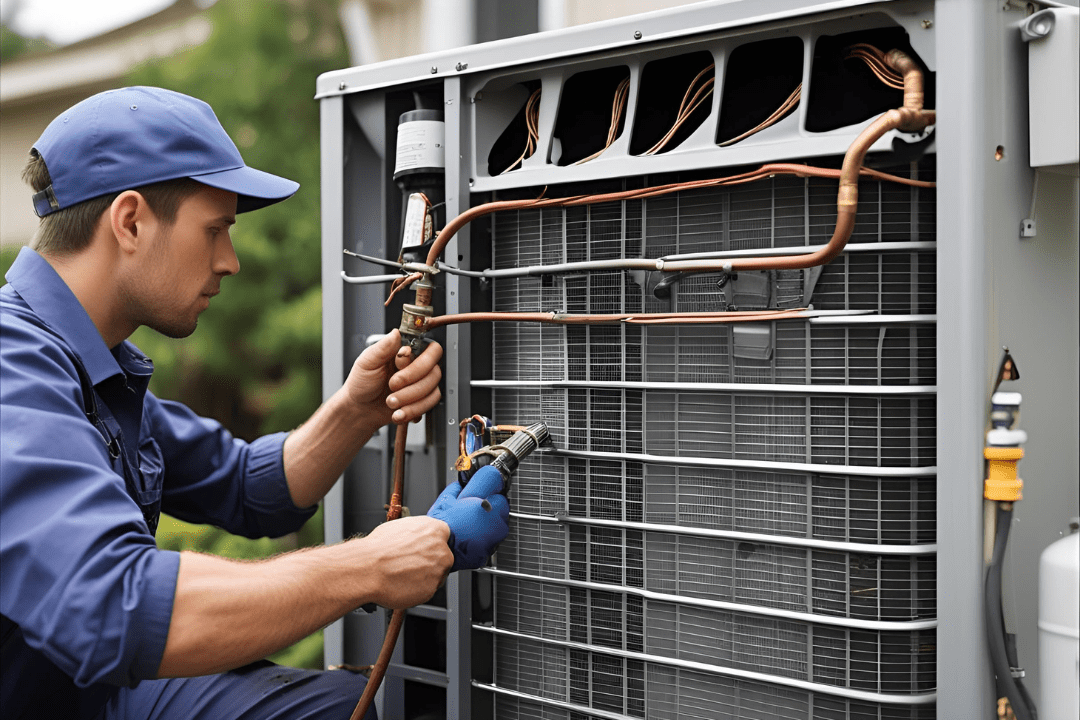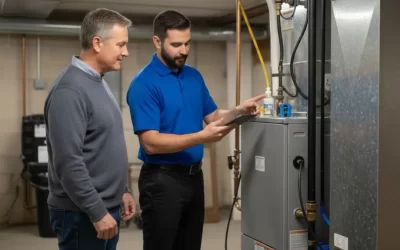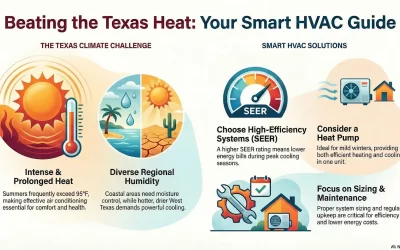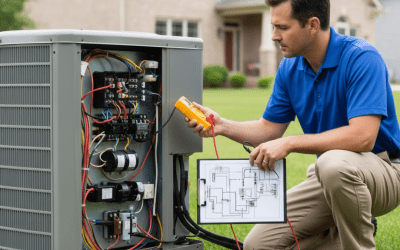When your air conditioner isn’t cooling properly, the root of the issue may lie in the condenser. It is the component that turns hot refrigerant gas into a cooler liquid. This process allows your AC to release heat effectively and keep your space comfortable. But when the AC condenser stops working, the entire system fails to perform efficiently, which results in discomfort and often, unexpected repair bills. The good news is that you can eliminate condenser problems by identifying issues early and fixing them promptly.
In this blog, we will understand what leads to condenser failure and how responding can save time, money, and hassle in the long run.
How Does the AC Condenser Work?
Understanding why an AC system may fail starts with knowing how its core components work together. Among them, the condenser plays a critical role by converting high-pressure refrigerant gas into a liquid, releasing absorbed heat into the outside air through metal coils. A fan inside the condenser unit pushes air across these coils, boosting the efficiency of this heat transfer process.
In short, the condenser is where the refrigerant cools down and returns to the indoor unit to absorb more heat. Any disruption in this process leads to inadequate cooling and reduced system performance.
Reasons for AC Condensers’ Failure
A number of internal and external factors can cause the condenser to fail. Below are the main reasons that can cause this critical component to stop functioning effectively:
Capacitor Problems:
A capacitor helps start the motors of both the fan and the compressor. If it fails, you may notice that the AC condenser is not working at all. The fan might not move, and the compressor could remain silent, as it doesn’t receive the necessary charge to start.
Motor Malfunction:
One of the more common issues homeowners face is an AC condenser fan not working. This may be caused by a faulty motor or an obstruction that prevents the fan from spinning. A broken fan not only leads to overheating but also hinders the entire cooling cycle.
Electrical Failures:
Electrical issues such as a blown fuse, damaged wiring, or a tripped circuit breaker can stop the condenser from functioning. If you discover that the AC condenser is not turning on, these electrical components should be among the first to inspect. Rodents and insects can also damage wires, creating unseen electrical problems.
Contactor Damage:
The contactor acts as a switch that controls the flow of electricity to the condenser. Over time, wear and tear can cause it to stick, arc, or fail completely. When this happens, the condenser may not receive consistent or adequate power. This can prevent the fan or compressor from running properly, causing the system to overheat or short-cycle, both of which can lead to serious condenser damage if left unaddressed.
Debris and Dirt:
Outdoor condenser units are exposed to environmental elements, making them prone to accumulating dust, leaves, and grass clippings. When the coils become clogged, heat cannot dissipate effectively. The system works harder than it should and may eventually shut down, leading to what seems like a condenser not working situation.
Compressor Failure:
The compressor pressurizes refrigerant and drives it through the system. When it fails, the condenser can’t release heat properly. In some cases, debris from a failed compressor can clog or damage the condenser coils, leading to further system failure.
Warning Signs of a Bad AC Condenser
Recognizing signs of a failing condenser before it shuts down completely can prevent costlier repairs. Watch for:
- AC condenser fan not working – The fan blades don’t spin at all, even with a gentle push.
- Weak or no airflow from indoor vents, even though the fan (inside) runs normally.
- Warm air blowing instead of cold, or your system struggling to achieve the set temperature.
- Buzzing, humming, or grinding sounds from the outdoor unit often indicate contactor or motor issues.
- Frequent short cycles or automatic shutdowns, often a sign of overheating or internal faults.
- Increased energy bills without improved cooling.
- Seeing visible debris, bent fins, or obstructed airflow around the unit.
Get expert AC condenser service with us to keep your system running efficiently year-round.
Cost of AC Condenser Repair or Replacement
The cost of repairing or replacing an AC condenser can vary significantly based on the problem’s complexity and your system’s age. Below is a breakdown of common repair types, their typical price ranges, and factors that influence the final expense.
Minor Electrical Repairs:
Small electrical issues, such as a faulty capacitor, are among the most affordable fixes. Capacitor replacements typically cost between $150 and $400, and while inexpensive, they’re essential for starting your AC system. If your AC condenser is not working due to such a fault, this is often a manageable and quick fix.
Fan Motor Replacement:
When the AC condenser fan is not working, the motor might be to blame. Replacing a burnt-out fan motor is more involved and generally costs between $200 and $700, depending on your unit’s brand and model.
Coil Damage or Refrigerant Leaks:
Larger issues, such as damaged coils or refrigerant leaks, require more extensive labor and time. These types of repairs often fall between $800 and $2,000, depending on the extent of the damage. Since these problems directly affect cooling performance, addressing them quickly is essential to avoid system strain.
Compressor Failure and Full Replacement:
If the compressor fails, a significant component of the system, most HVAC professionals recommend replacing the entire condenser unit. The AC condenser replacement cost typically ranges from $1,200 to $4,000, depending on the system’s efficiency rating, brand, and size.
Older Units and Refrigerants:
Another cost factor is the type of refrigerant your system uses. Older units running on phased-out refrigerants like R-22 can be more difficult and expensive to service. In these cases, upgrading to a newer, energy-efficient unit often makes more sense long-term.
Efficiency and Long-Term Savings
Newer AC condensers are designed with improved energy efficiency standards, which can help reduce monthly utility bills. While the upfront cost may seem high, it often pays off through lower energy consumption and reduced repair needs.
For accurate pricing and reliable service, it’s best to consult a local technician. Whether you’re dealing with minor issues or evaluating a potential replacement, look for professionals offering AC repair near you to get the right guidance.
Conclusion
Routine maintenance, including coil cleaning and visual inspections, plays a vital role in avoiding sudden breakdowns. Knowing how to check if an AC condenser is working gives you an edge in identifying issues early. However, if repair costs begin to climb, replacing the unit might be the more cost-effective solution.
When that time comes, having an experienced and well-regarded service provider you can trust makes all the difference. At Classic Services Air Conditioning & Heating, we specialize in diagnosing and repairing minor electrical faults to complete condenser replacements. Our team is committed to keeping your system efficient, reliable, and ready for even the hottest days. You can also check out our blog for a comprehensive guide to AC repair components and cooling efficiency, which will help you better understand how each part affects your system’s performance.






